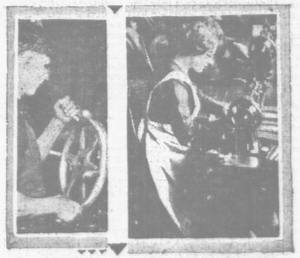|
By accessing or using The Crittenden Automotive Library™/CarsAndRacingStuff.com, you signify your agreement with the Terms of Use on our Legal Information page. Our Privacy Policy is also available there. |

TAKING WORRY ABOUT "FAMILY'S FUTURE IF I DIE" OFF WORKINGMAN'S SHOULDERS
|
|---|
|
|
TAKING WORRY ABOUT "FAMILY'S FUTURE IF I DIE" OFF WORKINGMAN'S SHOULDERS
Dean Halliday
The Day Book
July 15, 1915, Noon Edition & Last Edition
Detroit, Mich., July 15.—Taking the worry of the "family's future in case I die" off the shoulders of workingmen is the latest step in welfare work for workers. Employers are doing it now by taking out life insurance for their workingmen and in at least one instance for working women.
This instance is in the case of The Studebaker Corporation, the mammoth wagon and automobile manufacturing concern of Detroit and South Bend, Ind., which has just inaugurated the new insurance plan for their 8,000 employees, about 300 of whom are women.
Concerns all over the country are rapidly taking to the idea in various forms among them The Edison company, National Lead company, The Michigan Stove Works and Montgomery Ward and company.
The plan as adopted by The Studebaker corporation for employes in the automobile plant in Detroit and the wagon workers in South Bend is a simple one and has "no strings" attached to it.
All employes, excepting the office workers and minors are given a straight life policy for amounts varying from $600 to $1,000.
The cost to the company when the plans is in full operation will be several millions, for the policy when it is handed to the employe is paid up for life.
"In addition to the fact that employes get a paid up life insurance in a good company absolutely free, there is the second and almost equally important point that about 40 per cent of the men are middle aged and could not pass the severe physical examination they would have to if they applied individually to the insurance company," says J. E. Spencer, the Studebaker official who has charge of the new insurance plan. "In making our contract the insurance company agreed to accept our physical test for the men. This is not nearly so severe."
New employes are investigated before given insurance. If their home conditions or conduct while away from work is found to be unsatisfactory they are not threatened or warned. On the contrary it is pointed out to them that if they wish they will find themselves the gainers by rectifying conditions. When they show an improvement in their personal affairs then their life is insured without further quibbling.
If a worker quits or is discharged the policy is automatically forfeited, but aside from that he has full control over the policy. It is his and he can make whosoever he wishes his beneficiary or can change is as often as necessary, or as he desires.
"Worry," declares one Studebaker official, "wears down a man's efficiency far quicker than hard work. This insurance idea will take the everlasting worry about the "family's future" from the shoulders of the man—even one with a good job. It's going to make our men better workingmen."


















